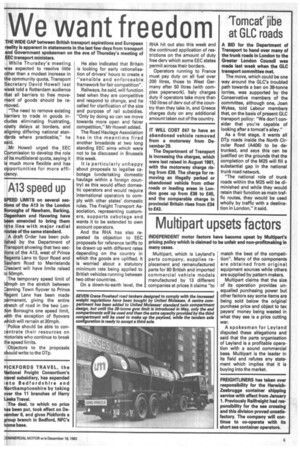We want freedom
Page 5

If you've noticed an error in this article please click here to report it so we can fix it.
E WIDE GAP between British t r lity is apparent in statements nd Government spokesmen on EC transport ministers.
While Thursday's meeting as expected to resolve little o her than a modest increase in t e community quota, Transport ecretary David Howell last eek told a Rotterdam audience that all barriers to free movement of goods should be removed.
"The need to remove existing b rriers to trade in goods in c udes eliminating frustrating, c stly delays at borders, and aligning differing national standards where practicable," he said.
Mr Howell urged the _ EEC Commission to develop the role o its multilateral quota, saying it i much more flexible and has opportunities for more efficency. ransport aspirations and European in the last few days from transport the eve of Thursday's meeting of He also indicated that Britain is looking for early rationalisation of drivers' hours to create a "sensible and enforceable framework for fair competition".
Railways, he said, will function best when they are competitive and respond to change, and he called for clarification of the size and purpose of rail subsidies. "Only by doing so can we move towards more open and fairer competition," Mr Howell added.
The Road Haulage Association has in the meantime fired another broadside at two long standing EEC aims which were not to be discussed in Brussels this week.
It is particularly unhappy about proposals to legalise cabotage (undertaking domestic haulage within a foreign country) as this would affect domestic operators and would require international operators to comply with other states' domestic rules. The Freight Transport Association, representing customers, supports cabotage and wants it to be extended to own account operators.
And the RHA has also repeated its objection to EEC proposals for reference tariffs to be drawn up with different rates depending on the country in which the goods are uplifted. It is worried about a statutory minimum rate being applied to British vehicles running between two other countries.
On a down-to-earth level, the RHA hit out also this week and the continued application of restrictions on the amount of duty free dery which some EEC states permit across their borders.
Operators running to France must pay duty on all fuel over 200 litres, those to West Germany after 50 litres (with complex paperwork). Italy charges duty if operators take more than 150 litres of dery out of the country than they take in, and Greece charges duty on any additional amount taken out of the country.
IT WILL COST £47 to have an abandoned vehicle removed from a motorway from December 29.
The Department of Transport is increasing the charges, which were last raised in August 1981, with the motorway charge rising from £38. The charge for removing an illegally parked or abandoned vehicle from other roads or loading areas in London goes up from £36 to £45, and the comparable charge in provincial Britain rises from £34 to £43.




































